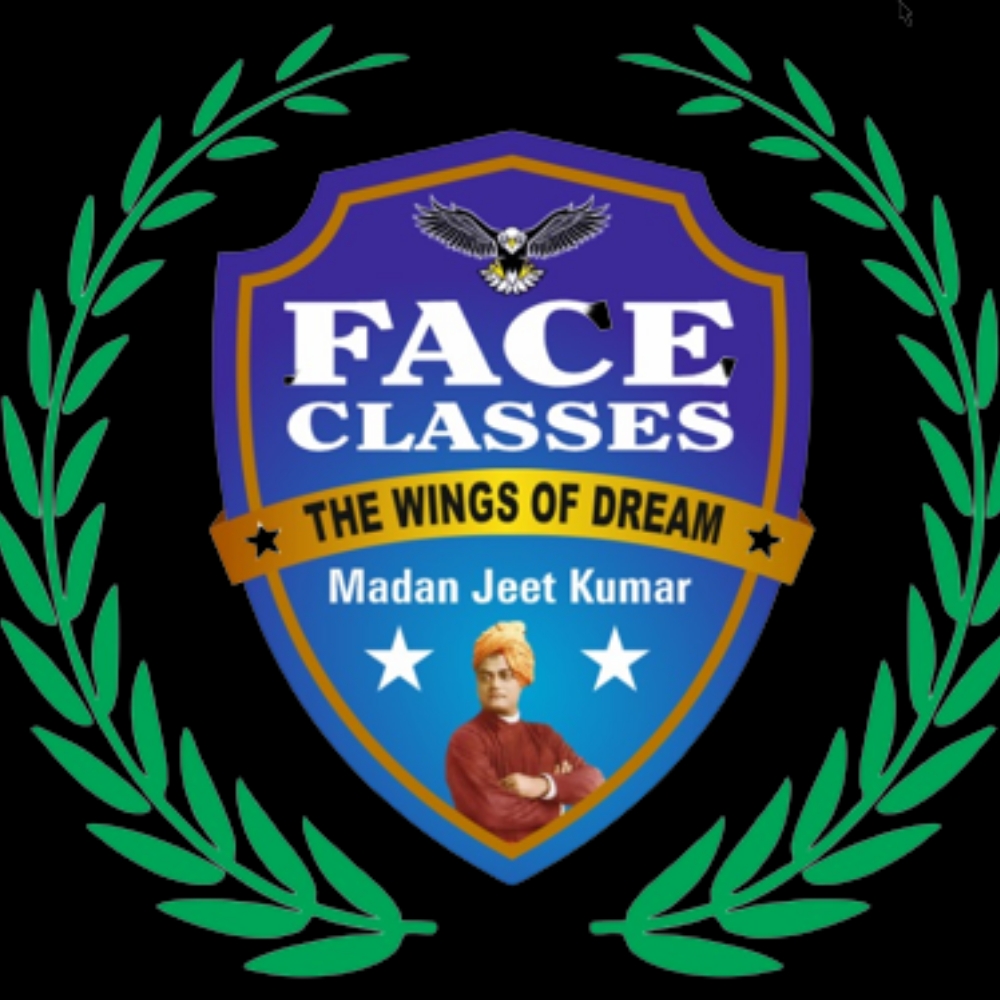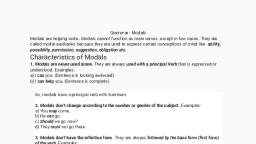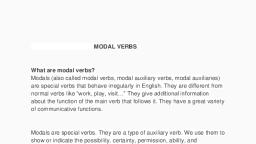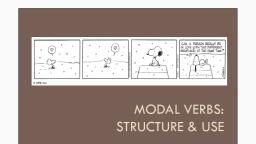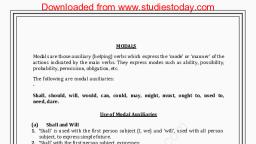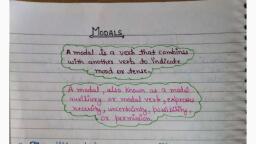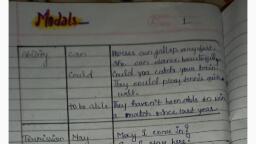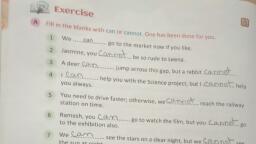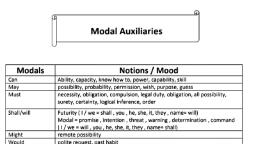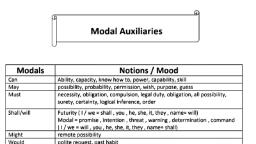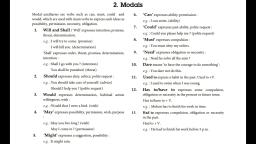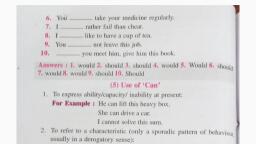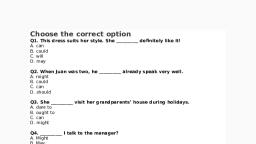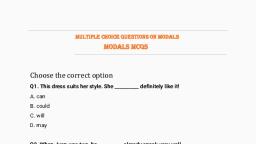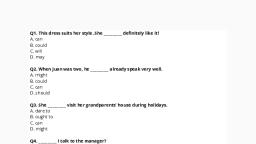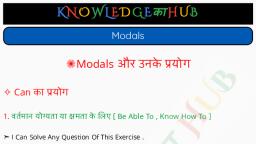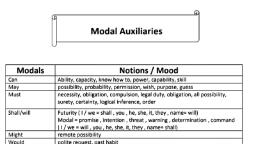Page 1 :
MODALS
Page 2 :
AUXILIARIES AND MODALS, The verbs is, was, have and did are used as full verbs., A, Man is mortal., Mahatma Gandhi was a great soul., I have four pens., She herself did it., Here verbs help the Principal Verbs to form Tenses, Interrogative or Negative sentences. So These verbs are called Helping or Auxiliary verbs., B, It is raining., The wounded were carried to the hospital., I have not written the letter., Did you learn your lesson?
Page 3 :
Auxiliary Verbs are those verbs which help other verbs to form their tense, mood and shape of meaning etc., , Be, have & do are Primary Auxiliaries. Their Forms are:, ‘Be’ - be, is, are, am, was, were, being, been, ‘Have’ - have, has, had, having, ‘Do’ - do, does, did, doing, done.
Page 4 :
The Primary Auxiliaries (Be, have & do) change their form according to the number and persons of the subject; as, I have, but he has, I do, but he does, I am, but he is, He was, but they were.
Page 5 :
Primary Auxiliaries are used to help in the formation of tenses, questions, negative and voices whenever they are used in combination with main verb. They can also be used alone. Then they function as the main verb.
Page 6 :
Shall, should; will, would; can, could; may, might; must, ought, used to, need and dare are modal auxiliaries., Modal Auxiliaries do not change (their form) according to the gender and number of the subject; as, I can ; you can ; he can ; she can ; they can.
Page 7 :
Modal Auxiliaries are called Modals because they express the mode or manner of the action denoted by the main verbs – whether the work can be done or not ; whether the action should take place or not ; whether the action is necessary or not ; whether there is hope for the completion of the work or not.
Page 8 :
USES OF THE PRIMARY AUXILIARIES, To Be (is / am / are / was / were / being / been), As a Principal Verb ; as –, (i) As an Intransitive verb of incomplete predication :, Examples : , She was present., Gold is precious metal., They are very hospitable., A cow is a gentle animal.
Page 9 :
As an Intransitive verb of complete predication in the sense of existence., Examples :, God is = God exists, Be wise = Show your existence as a Wiseman, To form the Continuous Tense ; as –, Birds are flying. (Present), The children were playing. (Past), I shall be waiting for you. (Future)
Page 10 :
(C) To form the Passive Voice ; As –, Active Voice Passive Voice, She cooks food. Food is cooked by her., I shall help you. You will be helped by me., You are buying a scooter. A scooter is being bought by you., You have broken my slate. My slate has been broken by you., 4. Mark the use of ‘to be’ in the following sentences ; as –, I am surprised to hear this., She was drowned in the river., If I were you, I would help him., He talks as if he were mad.
Page 11 :
Have (has/ have / had / having), (i) As a Principal Verb with some object to denote a sense of possession ; as –, She has a fine umbrella., We have our lunch at 12 noon. (have = take), I have an idea., We had no shoes on., (ii) To show temporary or occasional possession ; as –, We have supper at 9 p.m., Do you have supper at 9 p.m.?, We don’t have supper at 9 p.m., I have a daily walk., I have rest every afternoon.
Page 12 :
To form the Perfect Tense ; as –, She has lost her memory., He had hardly stepped out, when it began to rain., You had already replied to her letter., To give the meaning of ‘experience’ ; as –, We had a good time in Shimla., Did you have a good time in Shimla?, We didn’t have a good time in Shimla.
Page 13 :
To show compulsion or necessity when used with infinitive (to + verb in first form), He has to be in office by 9 A.M., He had to work hard to pass the Examination., In the form of Causal Auxiliary i.e. in the sense of getting something done by someone else and with shall / will :, He has his house white-washed last week., I will have my shirt stitched next week., Questions & Negatives are formed both ways with ‘have’ or with or without ‘do’, Have you a sister? Or, Do you have a sister?, I haven’t a tail., She hasn’t four hands.
Page 14 :
Has to / Have to / Had to / Shall have to / Will have to., To show obligation, compulsion, duty, desire etc., Has Mohan to wash his own clothes? (or), Mohan does not have to wash his own clothes., Does Mohan have to wash his own clothes?, Mohan has not to wash his own clothes., Have you to work late hours?, You haven’t to work late hours., Do you have to work late hours?, You don’t have to work late hours.
Page 15 :
Note. Has to / have to / had to / shall have to / will have to are also used to convey a sense of ‘external obligation’ in present, past and future tenses, e.g., I have to bring milk every morning., I shall have to run fast to catch the train., He has to go to office at 9 A.M., You will have to face many problems in life., I had to leave for Chennai last week., She has to be in school at seven.
Page 16 :
USE OF DO, As a Principal Verb ; as –, She does her work honestly., We did our duty., ‘Do’ is also used as an interrogative verb:, Do (act) as he tells you., Will it do?, To avoid repetition , How much money do you want? Twenty will do., He wastes my time every day. If he does today, I shall beat him.
Page 17 :
As a Helping Verb to form questions (Interrogative) ; as –, Do you like this book?, Did you attend her marriage?, Does she work regularly?, To make verbs negative; as –, She does not (doesn’t) like milk., He didn’t deliver a speech today., I don’t tell lies., To make sentences emphatic ; as –, Do see me tomorrow., She does sing well., You did tell a lie.
Page 18 :
Exercise 1, Fill in the blanks by using ‘has to’, ‘have to’, ‘had to’, will have to’, ‘shall have to’:, I --------- serve my aged parents., The maid servant --------- wash the utensils., The Light Brigade ----------- obey the orders of its commander., The hare --------- cut a sorry figure on losing the race., The passenger train ---------- stop at every railway station., The labourers -------- work all day long., My father --------- support a large family., I ---------- take my umbrella with me because it was raining., The mother -------- clothe the children., I ---------- take my mother to the dispensary., He ---------- join some service to earn his bread., I -------- help the poor widow.
Page 19 :
Answers, Have to, Has to, Had to, Had to, Has to, Have to, Has to, Had to, Has to, Shall have to, Will have to , Have to
Page 20 :
USES OF THE MODAL AUXILIARIES, SHALL, It is used to express the Future when Subject is I or We ; as –, When ‘Shall’ is used with ‘I’ and ‘We’, it does not denote the speaker’s desire. As –it means ‘I shall probably do so’ or ‘I may (be constrained) to do so’., I do not know whether I shall be able to come., I shall be twenty next month., If we walk fast, we shall catch the train.
Page 21 :
Shall is used to express command, threat, compulsion, promise,, certainty etc. for the second and third persons ; as-, He shall carry out my orders. (Compulsion), If you run fast, you shall catch the train. (Certainty), You shall be fined if you do not pay your school fee in time. (Threat), If you win the match, you shall have a holiday. (Promise), , In a statement shall is used to express the will, determination or intention ; not of the subject, but of the speaker ; as –, Here you shall have mangoes for the picking., So long as you are with, you shall never run short of money., He is my son. He shall have the best education.
Page 22 :
When shall is used as shall I, it has two meanings., (i) to seek advice (counsel) from each other., My scooter is old, Mohan, shall I sell it?, (ii) When we are ready / willing to do some service to somebody and ask the will or desire of the person addressed ; as –, Hari, you look to be tired, shall I dig for you for some time?, (iii) Shall we also means proposal ; as –, Shall we play cricket?, (i) When shall is used with the first person to Interrogative sentences, it expresses an offer or suggestion ; as –, Shall I bring a cup of tea for you?, shall I carry this bundle for you?, Shall we sit down and chat here?
Page 23 :
When shall is used with the third person in Interrogative sentences, , it expresses the speaker’s command or wish ; as –, Shall she check your notes?, Shall he give you a lift?
Page 24 :
WILL, Will is used for second and third persons to express Simple Future : as –, She will sing a song., They will reach home before sunset., He will win the race., When will you return my book?, Will you can express an invitation or request :, Will you have some more tea?, Will you come to tea tomorrow?, But in formal talks we do not use ‘will you’. In reality, ‘will you’ is a polite submission or invitation. ‘Have some more tea’ has lesser degree of politeness, Have some more tea. Come to tea tomorrow.
Page 25 :
With the first person will expresses determination, promise, resolution, order, threat, willingness, offer or intention ; as –, I will return your book tomorrow. (Promise), I will never tell a lie. (Determination), We will fight to the last. (Determination), I will punish you, if you do not speak the truth. (Threat), We will eliminate poverty. (Resolution), You will go to Delhi. (Order), I will help you in your project. (Offer), I will go home to bring money. (Intention)
Page 26 :
SHOULD, ‘Should’ is the Past Tense of ‘shall’, ‘Should’ is used :, To express the Past Tense in the Indirect Speech ; as –, I told him that I should reach home at night., He asked me if I should help him., Direct. The Principal said to the peon, “You shall reach school at ten on Sunday”., Indirect. The principal told the peon that he should reach school at ten on Sunday., To express duty, advice, a sensible action or obligation ; as –, You should take exercise daily. She should have dropped me a letter., You should have obeyed your parents. He should speak the truth., You should begin your work as you have taken rest.
Page 27 :
To express logical necessity or probability, assumption, deduction / inference ; as –, She should be by her ailing mother at this time., My shirt should be ready by now., To express probable condition ; as –, Should he come here, give him my massage., Should he disobey you, report it to me., To express a request for permission ; as –, I should like to inform you (i.e. if you permit me) that I am not at fault., I should like to say that it was he who broke the window pane.
Page 28 :
To denote surprise or unexpectedness ; as –, That he should top the list., It is really sad that he should lose his only son., , Note :- Lest is always followed by ‘should’ but not with negative word:, Work hard lest you should not fail. (Incorrect), Work hard lest you should fail. (correct)
Page 29 :
WOULD, ‘Would’ is the Past Tense of ‘will’., ‘Would is used :, To express the Past Tense of will or shall in the Indirect speech ; as –, She said that she would also fly kites., They said that they would carry the day., Direct. You said, “I shall take the test tomorrow”., Indirect. You said that you would take the test the next day., To express a habitual activity in the past ; as –, In her village she would sit by the river and watch the rippling waves., In winter he would study till late at night., After dinner he would go out for a stroll.
Page 30 :
To express a suggestion or polite request ; as –, Would you mind opening the window?, Would you please show me your book?, To express a wish or preference ; as –, Would that he were here at this time!, I would like to explain my point of view., To express a wish or preference ; as –, He would rather break than stoop., I would rather have a cup of milk than tea., To express the imagined or improbable result or unreal condition ; as –, If you had invited me, I would have come., Had you helped me, I would have passed., Would that I were rich!
Page 31 :
To express intention or determination ; as –, I would have my say., I would never leave you in the lurch., To express a not very hopeful wish relating to the future :, I wish it would stop raining., To feel sorry in the matter that someone is unwilling to do something which the speaker either approves of or disapproves., I wish he would go to college. (I am sorry he does not go to college), I wish he wouldn’t keep talking about himself., (I am sorry he keeps talking about himself)
Page 32 :
EXERCISE, Fill in the blanks with ‘shall’ or ‘will’ in the following sentences :, Sharda --------- get a prize., I ------- help you as far as possible., Sushma ---------- be expelled from school for her misbehavior., --------- you open the door, please?, Mattoo ---------- not enter the village again., We ----------- teach him a lesson., You -------- have a holiday tomorrow., ----------you keep quiet and not disturb the others ?, --------- I help you?, They ------- be glad to hear of your success., Nanu ---------- be six years old in April next., I --------- be surprised if you stand first.
Page 33 :
Answers, Will, Will, Shall, Will, Shall, Will, Shall, Will, Shall, Will, Shall, Will
Page 34 :
EXERCISE, Add ‘should’ or ‘would’ whichever is correct in the following sentences :, She said that the man ----------- come and apologies., He said that he --------- look into the matter., Work hard, so that you ---------- pass., We ----------- go out for a walk after supper., ----------- that I were the Home-Minister of India !, ---------- you have a cup of tea at my house ?, --------- I guide you how to tackle that rogue ?, Radha said that she ---------- hire a scooter., We ----------- try to speak correct English., You ------------ not hesitate to talk freely to her., Rajni --------- rather starve than beg., When we were in the village, we --------- breathe in fresh air.
Page 35 :
Answers, Should, Would, Should, Would, Would, Would, Should, Would, Should, Should, Would, Would
Page 36 :
MUST, To express duty, obligation, compulsion, certainty, strong belief, necessity or emphatic advice ; as –, Man must die sooner or later. (Strong belief), All must die sooner or later. (Certainty), The case is serious. You must consult the doctor. (Necessity), We have taken rest now. We must begin our work. (Emphatic advice), You must beg pardon of your teacher. (Compulsion), You must do your sincerely. (Duty), A student must obey the rules of his school. (Strong obligation)
Page 37 :
To express determination ; as –, I must reach the playground in time., We must cross the river to attack the enemy., To express possibility or inference ; as –, She must have reached home by now., There must be a mistake somewhere., She must be around forty., To express logical necessity ; as –, It is drizzling. You must take your umbrella with you., You are tired now. You must be feeling hungry., You must take exercise to keep healthy.
Page 38 :
OUGHT, ‘Ought’ is followed by the Infinitive with ‘to’. It is used to express duty, and, A moral or social binding. The duty, and moral or social binding is something internal. There is no outside force or compulsion. The speaker only reminds the listener about it. It is effective. It may refer to Present, Past or Future Tense., We ought to respect our elders., He ought to serve his old parents., You ought to do your duty., Oughtn’t we love our motherland?, He has burnt midnight oil. , He ought to win a scholarship., You ought to have obeyed your teacher.
Page 39 :
CAN, ‘Can’ means ‘be able to’ or ‘know how to’., ‘Can’ is used :, To express ability, temporary or permanent ; as –, I can open this lock., She can speak English fluently., To grant permission ; as –, You can show me your homework tomorrow., She can enter the house now., Can I go home now?, In order to seek permission, ‘May’ shows more politeness and courtesy than ‘Can’, May I go out, sir? (polite request), Can I go out, sir? (impolite request)
Page 40 :
To express possibility ; as –, Anything can happen to her on the way., Any good student can solve this sun., ‘Can’t help’ means ‘can’t avoid’. It is used in idiomatic sense ; as –, It is so funny. I can’t help laughing., She is a woman. She can’t help weeping.
Page 41 :
COULD, ‘Could’ is the Past Tense of ‘Can’. It is used for all persons in the past tense., ‘Could’ is used :, To express the Past Tense of ‘can’ in the Reported Speech ; as –, She said that I could also sing., He asked me if I could help him., To express ability ; as –, I could solve all the sums., She could not win the match., To express a polite request ; as –, Could you show me your pen?, Could I consult you in this matter again?
Page 42 :
To express negative deduction., He says that he is reading a novel still., He couldn’t be reading it still., To express permission ; as –, The students could go to the market on holidays., To express probability ; as –, If I had the money, I could buy ornaments., Could + perfect infinitive is used for past ability when the :, Action was not performed :, He could have stopped the car (but he didn’t), We don’t know whether it was performed or not, The money has disappeared. Who could have taken it?
Page 43 :
MAY, ‘May’ is used for all persons in the present and future tense:, To seek or grant permission ; as –, May I call on you tomorrow? Yes, you may., You may go home now., To express possibility ; as –, She works hard now. She may pass., You may not reach there in time., To express a wish or prayer ; as –, May you be happy and prosperous !, May God have mercy on you !, To express a purpose ; as –, We eat so that we may live., She works hard so that she may pass.
Page 44 :
MIGHT, ‘Might’ is the Past Tense of ‘May’. It is used for the all persons in the past tense., Might is used :, To express the Past Tense of ‘May’ in the Reported Speech ; as –, I said that he might take my bicycle., He asked me if he might come in., (i) To express a doubtful possibility ; as –, The Inspector might visit the school., She might come by the night train., (ii) To express speculations about past actions ;, He told me that she might have stood first., This drug might have cured your cough and cold.
Page 45 :
‘Might’ is also used in persuasive request. It shows the speaker’s anger because some action has not been done., You might tell his mother what he said., It means : Please tell his mother ……………, Or, I am annoyed that you did not tell his mother what he said., ‘You might’ can also express the casual command wherein the speaker has the certainty that his command will be obeyed., You might post this letter, Means please post this letter for me, will you?
Page 46 :
USED TO, ‘Used to’ expresses a habit in the Past. It has no Present Tense form. It is always used with the infinitive of other verbs to make the habitual past tense as –, Affirmative : I used to go out for a walk. (but now I don’t), He used to drink at night daily. (now he doesn’t), Negative : He used not to tell lies. (Now he does), Interrogative : Used he to smoke ?
Page 47 :
Here ‘Used to’ means ‘to be habituated’. In such sentences ‘used to’ is preceded by be / seem / get / become etc ; as –, Please, behave yourself, I am not used to this kind of rude behaviour., I am not used to working in the sun.
Page 48 :
NEED, As a Principal Vern, ‘need’ means ‘to stand in need of’. Its three forms are need, needed and needed. It is used in all tenses. It can also form its negatives and interrogatives with the help of ‘do’ just like other verbs ; as –, She needs money. (Present), I needed your help. (Past), He needs to consult you. (Present), You will need my help. (Future), She does not need your help. (Negative), Didn’t this exercise need to be done with care ? (Interrogative)
Page 49 :
As a Defective Verb, ‘need’ implies the absence of necessity or obligation. It is used in the Present Tense. It takes an Infinitive without ‘to’ as its object. It can also be used to form negative and interrogative sentences like other auxiliaries ; as –, You need not work now., What need you go to him?, He need not wait for me., She is tired. She must / needs to lie down.
Page 50 :
DARE, As a Principal Verb, ‘dare’ means ‘to venture’, ‘to have courage’, ‘to challenge’ or ‘disobey / defy orders’. It admits of the forms dare (dares), dared. It is used in all tenses. As –, Dare she disobey me?, He dared to risk his life., I dare to say that you are a liar., She dare me to face her.
Page 51 :
As a Defective Verb, ‘dare’ means ‘to take courage’. It admits of forms dare, dared. It is used (only) in the negative and interrogative sentences. ‘To’ is not required to complete it ; as –, He dare not say so., She dared not oppose me., How dare you enter the room?, How dared he abuse me?
Page 52 :
Exercise 3, Fill in the blanks with should, could :, We ---------- stand unite., I --------- drive a car at the age of twelve., My father --------- write five languages., You --------- not forget your liabilities., She -------- see a doctor at once., He asked me whether the news ---------- be true., We --------- not overeat ourselves., They asked us if we ---------- help them., ---------- I ask you a riddle?, You --------- not worry so much about your health.
Page 53 :
Answers, Should, Could, Could, Should, Should, Could, Should, Could, Could, Should
Page 54 :
Exercise 4, Fill in the blanks with must, should or needn’t :, You --------- hurry; there is plenty of time., Work hard lest you --------- fail., I --------- work hard to win a scholarship., You ---------- work hard for a better tomorrow., You --------- help my brother ; I will look after him., I ------- like to tell you that Jag Mohan is a pick pocket., You -------- stop smoking., ---------- they work hard, they will pass., We --------- look after our aged parents., Be vigilant lest you --------- be robbed., We ----------follow the rules of the road., You ----------be ever ready to face the devil., If it --------- rain, we shall not go out., You -------- learn your lesson by tomorrow., I --------- buy a watch ; my uncle has presented me a watch.
Page 55 :
Answers, needn’t 2. should 3. must, 4. Should 5. needn’t 6. would, 7. Must 8. should 9. must, 10. Should 11. must 12. should, 13. Should 14. must 15. needn’t
Page 56 :
Exercise 5, Fill in the blanks with have, had o, must, should, needn’t :, I ---------- take a cup of tea every morning., It is quite late, I --------- go home now., I thought I ------- go to Patna the next day., You -------- help her since she looks down upon you., Sarla -------- dance at my birthday party., The day is dark and cloudy, it ---------- rain tonight., You -------- not hit your dog like that., She -------- scold her son for wasting his time., He ------- be here by now., You------- not disobey your parents., I --------- rush to my village to attend my uncle’s funeral., I ------- get my hair cut every month., She ---------- attend the meeting., You ---------- go to the forest in the dark., I ---------- teach my brother for a month.
Page 57 :
Answers, Have to 2. must 3. should, 4. needn’t 5. had to 6. must, 7. Should 8. had to 9. should, 10. Must 11. had to 12. have to, 13. Must 14. needn’t 15. had to
Page 58 :
Exercise 6, Fill in the blanks with should, could, must, may, might :, It ---------- rain today., The Education Minister --------- visit our school next week., I told him that I ---------- succeed., ---------- I use your scooter ?, You ------ not sit idle., She told me that she --------- dance on the stage., We --------- pay our taxes in time., If he had worked hard, he --------- stand first., Take an umbrella; it --------- rain any time., You have studied for eight hours; you -------- be tired., You ------- take my pen if you do not have your own., --------- you lend me your bicycle?, You ------- not drink in public places., Work hard, so that you --------- pass., He prayed that he ----------- live long.
Page 59 :
Answers, May 2. might 3. should, 4. May 4. should 6. could, 7. Must 8. could 9. might, 10. Must 11. may 12. could, 13. Must 14. may 15. might
Page 60 :
THANK YOU
